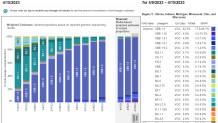Since the pandemic began more than three years ago, numerous variants have emerged as the virus that causes COVID-19 evolved, and as a new subvariant catches the eye of scientists, the city's top doctor says that her department is ready to deal with any increase in cases.
Dr. Allison Arwady, commissioner of the Chicago Department of Public Health, says that current COVID boosters are still providing protection against the "Arcturus" variant, otherwise known as omicron variant XBB.1.16.
“This is still at that lowest level where we’re keeping an eye on it, so it’s good for people to be aware,” she said. “If you’ve had your most recent vaccines and you are up to date, you have the right protection, including against this subvariant.”
The arcturus subvariant could potentially be causing a new symptom: conjunctivitis, known as red or pink eye, which is often combined with itchiness.
“If you’ve got red, itchy eyes, and you think it’s allergies or just a cold, just take a COVID test to be sure,” she said. “Overall, this is still all omicron, which is good news if you’re up-to-date with your COVID vaccines. You have the best protection.”
Arwady says that residents should focus on getting new booster shots if they haven't already, and said that the bivalent boosters that became available in the fall should still provide protection.
The World Health Organization has considered the strain a "variant under monitoring" since March 22, and as of Friday, cases have been confirmed in around 20 countries. "Arcturus" is responsible for a surge in case counts in parts of the world, including India, where itchy or "sticky" eyes have been most often reported in children.
Local
XBB.1.116 has surfaced in the U.S., and although it hasn't led to high case numbers, there's the possibility the strain "may become more prominent in coming weeks," said Dr. Matthew Binnicker, director of the Clinical Virology Laboratory at the Mayo Clinic.
In fact, newly-released data from the Centers for Disease Control and Prevention shows the virus' spread has grown nationwide since it first surfaced. As of Friday, XBB.1.16 accounted for 7.2% of all U.S. COVID cases beginning the week of April 9, marking an increase from 3.9% a week prior. Overall, a different variant, XBB 1.5, called Kraken, remains the most common nationwide by far.
Feeling out of the loop? We'll catch you up on the Chicago news you need to know. Sign up for the weekly Chicago Catch-Up newsletter here.

Out of the 10 health care regions defined by the CDC, XBB.1.16 appears to be the most prevalent in Region 6, which includes Arkansas, Louisiana, New Mexico, Oklahoma and Texas. There, it made up 21.3% of all COVID cases from the week beginning April 9.
While present in the Midwest, the variant's spread appears to be much lower. In Region 5, which encompasses Illinois, Indiana, Michigan, Minnesota, Ohio and Wisconsin, "Arcturus" accounts for 6% of all COVID cases - nearly double the 3.1% from the week before.
On a nationwide scale and in Illinois, case numbers of respiratory infections, including COVID, have dropped in recent weeks due to the spring-like weather and many people spending more time outdoors.
Data released Friday by the Illinois Department of Public Health provided a look at improvements during the most recent week, specifically regarding COVID community level status. As of Friday, only six counties were at medium community level status for COVID, compared to 14 a week ago. There were no counties at high level status - for the fourth week in a row.
Higher levels of infectivity are being reported with newer variants, but overall, they tend to be causing less severe disease, which is likely the result of higher vaccination rates, higher rates of immunity from prior infection and lower pathogenicity of recent variants, according to the Mayo Clinic.
Despite COVID rates being at a low level, doctors still insist that people adhere to COVID prevention measures, which include washing your hands frequently, avoiding close contact with people who are sick and staying home if you feel sick or have any COVID symptoms.



